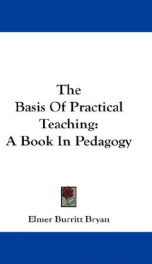fundamental facts for the teacher

Purchase of this book includes free trial access to www.million-books.com where you can read more than a million books for free. This is an OCR edition with typos. Excerpt from book: CHAPTER III ATTENTION AND CONDUCT If the function of the school is the development of the entire child, then the teacher must not attempt to educate any one set of faculties at the expense of any other. He must not try to train the mind without at the same time training the body. For physical well-being is not only an end in itself, but it is the basis for the development of all other ends. Few persons realize how close the relationship is between good health and consistent, effective attention. While the relationship is not one of cause and effect, it is certainly one as close as that of condition and resultant, because attention being a most fatiguing process, it follows that without an abundance of vitality upon which to draw, long-continued attention is impossible. The close relationship between good health, or the abundant life, and conduct is proverbial. Every one knows how nearly impossible it is for a nervous child in the home or in the school to behave itself, to order its conduct consistently, and every wise parent or teacher takes into account the health conditions of the child under his direction and makes due allowance for delinquencies in conduct which have theirorigin in deficient nervous supply and control. We all recognize the close relationship and parallelism between mental states and physical states, and from this close relationship has arisen the pedagogical maxim or ideal of "a sound mind in a sound body," thus recognizing the impossibility of the one without the other. It is a well established and accepted fact that there is no psychosis without neurosis, but it is not generally known that there is a psychosis peculiar to physical conditions and to physical and neural states. The consumptive is proverbially hopeful and cheerful, and although cogniz...
Info about the book
Author:
Series:
Unknown
ISBN:
0554712873
Rating:
3.5/5 (4)Your rating:
0/5
Languge:
English
Users who have this book
Users who want this book
What readers are saying
What do you think? Write your own comment on this book!
write a commentif you like fundamental facts for the teacher try:
Do you want to read a book that interests you? It’s EASY!
Create an account and send a request for reading to other users on the Webpage of the book!



